情态动词+have_done_结构
情态动词+have-done总结
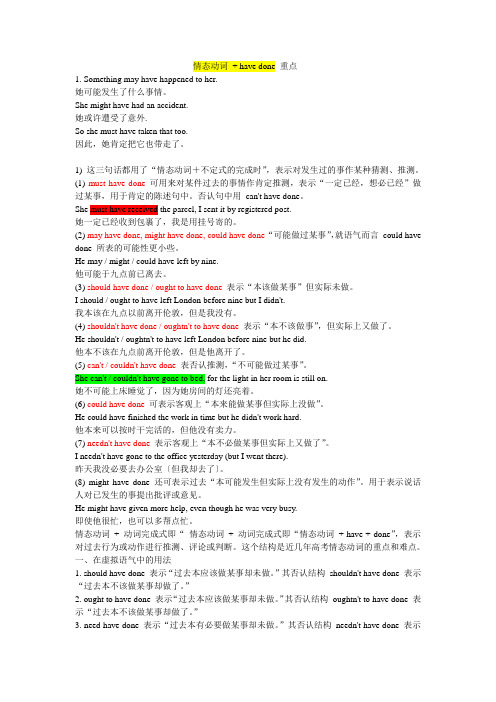
情态动词+ have done 重点1. Something may have happened to her.她可能发生了什么事情。
She might have had an accident.她或许遭受了意外.So she must have taken that too.因此,她肯定把它也带走了。
1) 这三句话都用了“情态动词+不定式的完成时”,表示对发生过的事作某种猜测、推测。
(1) must have done 可用来对某件过去的事情作肯定推测,表示“一定已经,想必已经”做过某事,用于肯定的陈述句中。
否认句中用can't have done。
She must have received the parcel, I sent it by registered post.她一定已经收到包裹了,我是用挂号寄的。
(2) may have done, might have done, could have done “可能做过某事”,就语气而言could have done 所表的可能性更小些。
He may / might / could have left by nine.他可能于九点前已离去。
(3) should have done / ought to have done表示“本该做某事”但实际未做。
I should / ought to have left London before nine but I didn't.我本该在九点以前离开伦敦,但是我没有。
(4) shouldn't have done / oughtn't to have done 表示“本不该做事”,但实际上又做了。
He shouldn't / oughtn't to have left London before nine but he did.他本不该在九点前离开伦敦,但是他离开了。
解读“情态动词+have done”结构
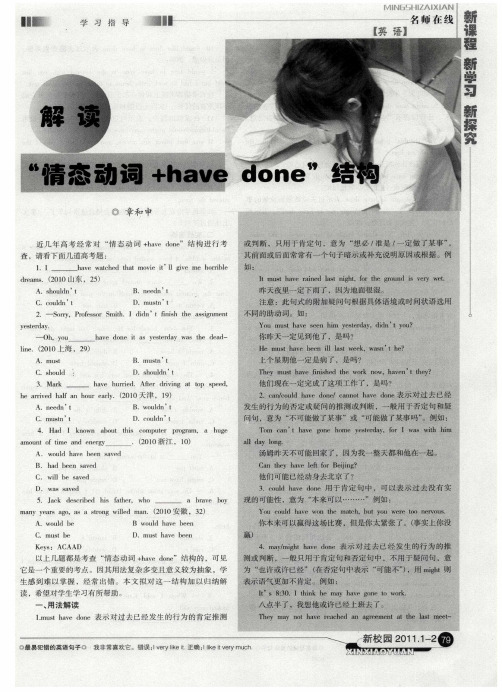
—
—
o
名师 在 线
一 一 …一 一 1 ~ t |
学习指导
; l 潮
新课程 新举习 新探究
i g n .
【 语】 英
1 .w ud l e/ v 0 h v o e 表示 过 去 愿 意 做 某 事 , 0 o l i 1 e t ae d n k 0
上 次会议 上他 们 或许 没有 达成 一致 的 意见 。
d n te r aet o e h g e ts mac e e ma e n t e a ttn e r. rh v r d i h p s e y a s
情 ,否定 形 式 为 “ hud nt u h n tt hv oe ,表 示相 so l o o g t o o ae d n ” / 反 的含 义 ,含有 责备 之意 。例 如 :
Yo a e a e u r lt .Yo s o l / u h t h v o t he u h u d o g t o a e c me o t me t e—
May r wa a e t ro s bs n f m te h me tn y se d y fen o . S e eig e tr a atr o n h mih v b e i1 g tha e e n l.
但 是 没做 成 。例如 :
1 wo l lv t h v g ne o h cn ma ud o e o a e o t t e ie wi y u ls t h o at ng t u I a t wo k xr h u s o fns a i o tn ts . ih b t h d o r e ta o r t ih n mp ra t a k i
情态动词+havedone的用法小结
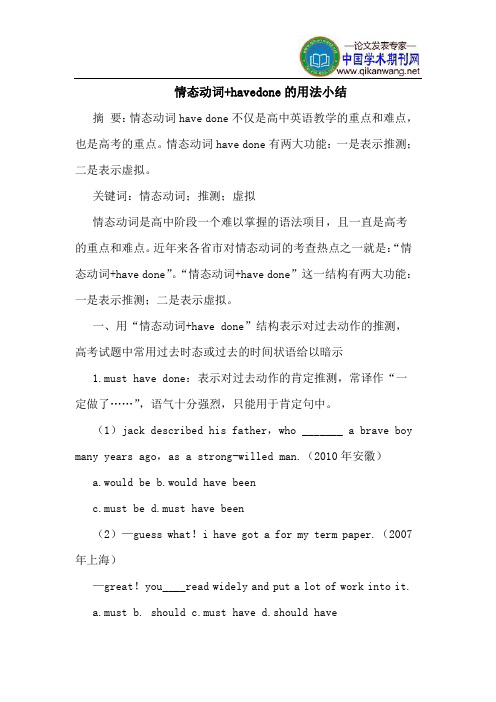
情态动词+havedone的用法小结摘要:情态动词have done不仅是高中英语教学的重点和难点,也是高考的重点。
情态动词have done有两大功能:一是表示推测;二是表示虚拟。
关键词:情态动词;推测;虚拟情态动词是高中阶段一个难以掌握的语法项目,且一直是高考的重点和难点。
近年来各省市对情态动词的考查热点之一就是:“情态动词+have done”。
“情态动词+have done”这一结构有两大功能:一是表示推测;二是表示虚拟。
一、用“情态动词+have done”结构表示对过去动作的推测,高考试题中常用过去时态或过去的时间状语给以暗示1.must have done:表示对过去动作的肯定推测,常译作“一定做了……”,语气十分强烈,只能用于肯定句中。
(1)jack described his father,who _______ a brave boy many years ago,as a strong-willed man.(2010年安徽)a.would beb.would have beenc.must bed.must have been(2)—guess what!i have got a for my term paper.(2007年上海)—great!you____read widely and put a lot of work into it.a.mustb. shouldc.must haved.should havekeys:d;c(注意:must have done只能表推测)2.may/might have done表示对过去的可能性推测“过去可能做了某事”,其程度小于must have done,一般也用于肯定句。
如:—i left my handbag on the train,but luckily someone gave it to the railway officials.—how unbelievable to get it back!i mean,someone _______ it.(2011年江苏)a.will have stolenb.might have stolenc.should have stolend.must have stolenkeys:b3.can/could (not)have done意思是“过去(不)可能做过某事”,常用于否定句和疑问句。
情态动词 have done难点突破 (2)
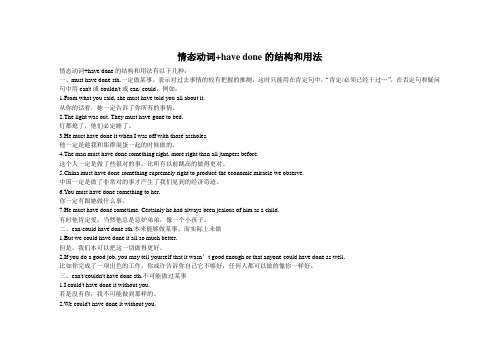
情态动词+have done的结构和用法情态动词+have done的结构和用法有以下几种:一、must have done sth.一定做某事。
表示对过去事情的较有把握的推测,这时只能用在肯定句中,“肯定/必须已经干过…”,在否定句和疑问句中用can't或couldn't或can/ could,例如:1.From what you said, she must have told you all about it.从你的话看,她一定告诉了你所有的事情。
2.The light was out. They must have gone to bed.灯都熄了,他们必定睡了。
3.He must have done it when I was off with those assholes.他一定是趁我和那群混蛋一起的时候做的。
4.The man must have done something right, more right than all jumpers before.这个人一定是做了些很对的事,比所有以前跳高的做得更对。
5.China must have done something supremely right to produce the economic miracle we observe.中国一定是做了非常对的事才产生了我们见到的经济奇迹。
6.You must have done something to her.你一定有跟她做什么事。
7.He must have done sometime. Certainly he had always been jealous of him as a child.有时他肯定爱,当然他总是忌妒弟弟,像一个小孩子。
二、can/could have done sth.本来能够做某事,而实际上未做1.But we could have done it all so much better.但是,我们本可以把这一切做得更好。
情态动词have_done

情态动词+have+done是历年高考的重点和难点之一,现将其用法总结归纳如下:一、must+have+done表示对过去事情的肯定推测,译成“一定做过某事”,该结构只用于肯定句.1. It must have rained last night, for the ground is wet. 昨晚一定下雨了,因为地面还是湿的2. You must have been mad to speak to the servant.你和仆人说话,一定是发疯了二、“can't+have+done”表示对过去事情的否定推测,译成“不可能做过某事”。
1. Mr. Smith can't have gone to Beijing, for I saw him in the library just now. 史密斯先生不可能去北京了,我刚才还在图书馆见过他。
2.Mary can't have stolen your money. She has gone home.玛丽不可能偷你的钱,她回家去了三、“can+have+done”表示对过去行为的怀疑,用于疑问句,译成“可能做过……吗?”。
1.There is no light in the room. Can they have gone out?屋里没有灯,他们可能出去了吗?2. There is nowhere to find them. Where can they have gone? 到处找不到他们,他们可能到什么地方去呢?四、could+have+done’是虚拟语气,表示对过去事情的假设,意思是本来能够做某事而没有做.He could have passed the exam, but he was too careless.本来他能通过考试,但他太粗心五、“may+have+done”表示对发生过的事情的推测,意思是“可能已经”或“也许已经”,用于肯定句中。
时态呼应在”情态动词+have+done”结构中的应用
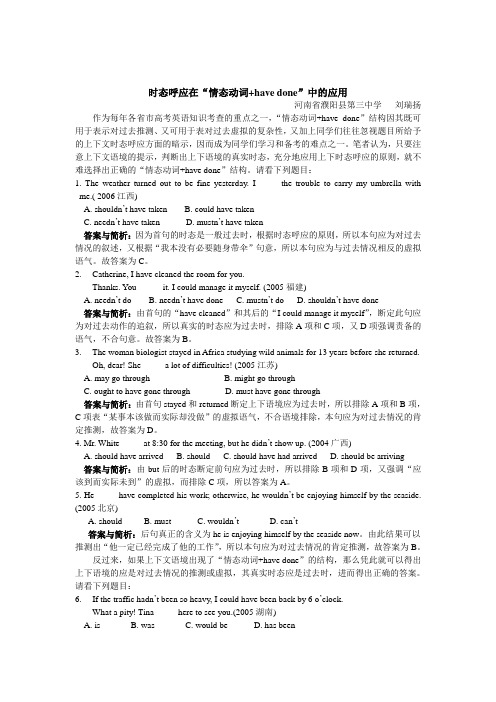
时态呼应在“情态动词+have done”中的应用河南省濮阳县第三中学刘瑞扬作为每年各省市高考英语知识考查的重点之一,“情态动词+have done”结构因其既可用于表示对过去推测、又可用于表对过去虚拟的复杂性,又加上同学们往往忽视题目所给予的上下文时态呼应方面的暗示,因而成为同学们学习和备考的难点之一。
笔者认为,只要注意上下文语境的提示,判断出上下语境的真实时态,充分地应用上下时态呼应的原则,就不难选择出正确的“情态动词+have done”结构。
请看下列题目:1. The weather turned out to be fine yesterday. I_____ the trouble to carry my umbrella with me.( 2006江西)A. shouldn’t have takenB. could have takenC. needn’t have takenD. mustn’t have taken答案与简析:因为首句的时态是一般过去时,根据时态呼应的原则,所以本句应为对过去情况的叙述,又根据“我本没有必要随身带伞”句意,所以本句应为与过去情况相反的虚拟语气。
故答案为C。
2. ---Catherine, I have cleaned the room for you.---Thanks. You _____ it. I could manage it myself. (2005福建)A. needn’t doB. needn’t have doneC. mustn’t doD. shouldn’t have done答案与简析:由首句的“have cleaned”和其后的“I could manage it myself”,断定此句应为对过去动作的追叙,所以真实的时态应为过去时,排除A项和C项,又D项强调责备的语气,不合句意。
故答案为B。
3. ---The woman biologist stayed in Africa studying wild animals for 13 years before she returned. ---Oh, dear! She_____ a lot of difficulties! (2005江苏)A. may go throughB. might go throughC. ought to have gone throughD. must have gone through答案与简析:由首句stayed和returned断定上下语境应为过去时,所以排除A项和B项,C项表“某事本该做而实际却没做”的虚拟语气,不合语境排除,本句应为对过去情况的肯定推测,故答案为D。
情态动词+have done的构成及用法含译文
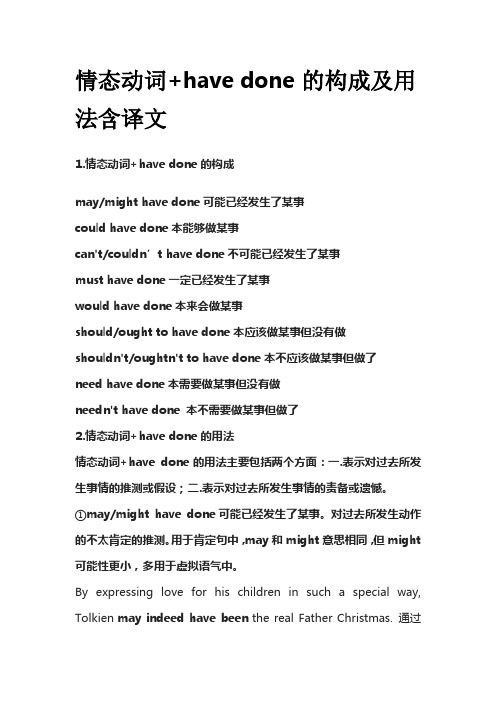
情态动词+have done的构成及用法含译文1.情态动词+have done的构成may/might have done可能已经发生了某事could have done本能够做某事can't/couldn’t have done不可能已经发生了某事must have done一定已经发生了某事would have done本来会做某事should/ought to have done本应该做某事但没有做shouldn't/oughtn't to have done本不应该做某事但做了need have done本需要做某事但没有做needn't have done 本不需要做某事但做了2.情态动词+have done的用法情态动词+have done的用法主要包括两个方面:一.表示对过去所发生事情的推测或假设;二.表示对过去所发生事情的责备或遗憾。
①may/might have done可能已经发生了某事。
对过去所发生动作的不太肯定的推测。
用于肯定句中,may和might意思相同,但might 可能性更小,多用于虚拟语气中。
By expressing love for his children in such a special way, Tolkien may indeed have been the real Father Christmas. 通过这种特别的方式表达对孩子们的爱,托尔金可能真的是真正的圣诞老人。
(新外研版必修二)You can check his office. He might have been there already. 你可以去他的办公室看看。
他可能已经到那儿了。
If he had been given more encouragement, he might have made greater progress. 如果给他更多的鼓励,他可能会取得更大的进步。
3.情态动词+have_done_结构(学案)
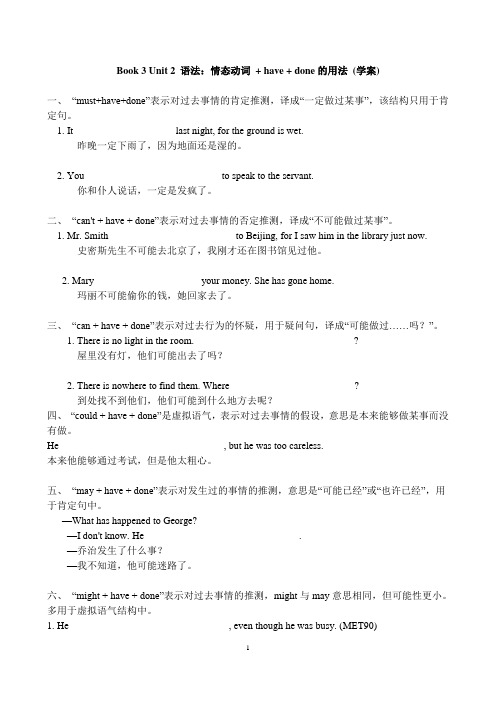
Book 3 Unit 2 语法:情态动词+ have + done的用法(学案)一、“must+have+done”表示对过去事情的肯定推测,译成“一定做过某事”,该结构只用于肯定句。
1. It ____________________last night, for the ground is wet.昨晚一定下雨了,因为地面还是湿的。
2. You ___________________________to speak to the servant.你和仆人说话,一定是发疯了。
二、“can't + have + done”表示对过去事情的否定推测,译成“不可能做过某事”。
1. Mr. Smith _________________________to Beijing, for I saw him in the library just now.史密斯先生不可能去北京了,我刚才还在图书馆见过他。
2. Mary _____________________your money. She has gone home.玛丽不可能偷你的钱,她回家去了。
三、“can + have + done”表示对过去行为的怀疑,用于疑问句,译成“可能做过……吗?”。
1. There is no light in the room.________________________________?屋里没有灯,他们可能出去了吗?2. There is nowhere to find them. Where_________________________?到处找不到他们,他们可能到什么地方去呢?四、“could + have + done”是虚拟语气,表示对过去事情的假设,意思是本来能够做某事而没有做。
He_________________________________, but he was too careless.本来他能够通过考试,但是他太粗心。
- 1、下载文档前请自行甄别文档内容的完整性,平台不提供额外的编辑、内容补充、找答案等附加服务。
- 2、"仅部分预览"的文档,不可在线预览部分如存在完整性等问题,可反馈申请退款(可完整预览的文档不适用该条件!)。
- 3、如文档侵犯您的权益,请联系客服反馈,我们会尽快为您处理(人工客服工作时间:9:00-18:30)。
情态动词+have+done一、“must+have+done”表示对过去事情的肯定推测,译成“一定做过某事”,该结构只用于肯定句。
1. It must have rained last night, for the ground is wet.昨晚一定下雨了,因为地面还是湿的。
2. You must have been mad to speak to the servant.你和仆人说话,一定是发疯了。
二、“can't+have+done”表示对过去事情的否定推测,译成“不可能做过某事”。
1. Mr. Smith can't have gone to Beijing, for I saw him in the library just now.史密斯先生不可能去北京了,我刚才还在图书馆见过他。
2. Mary can't have stolen your money. She has gone home.玛丽不可能偷你的钱,她回家去了。
三、“can+have+done”表示对过去行为的怀疑,用于疑问句,译成“可能做过……吗?”。
1. There is no light in the room. Can they have gone out?屋里没有灯,他们可能出去了吗?2. There is nowhere to find them. Where can they have gone?到处找不到他们,他们可能到什么地方去呢?四、“could+have+done”是虚拟语气,表示对过去事情的假设,意思是本来能够做某事而没有做。
He could have passed the exam, but he was too careless. 本来他能够通过考试,但是他太粗心。
五、“may+have+done”表示对发生过的事情的推测,意思是“可能已经”或“也许已经”,用于肯定句中。
—What has happened to George?—I don't know. He may have got lost.—乔治发生了什么事?—我不知道,他可能迷路了。
六、“might+have+done”表示对过去事情的推测,might与may意思相同,但可能性更小。
多用于虚拟语气结构中。
1. He might have given you more help, even though he was busy. (MET90)他或许会多给你一些帮助,即使他很忙。
2. She might have achieved greater progress, if you had given her more chances.如果你多给她点机会,她可能已经取得更大的成绩。
七、“would+have+done”虚拟语气,表示对过去事情的假设,意思是“本来会做”。
1. I would have told you all about the boy's story, but you didn't ask me.我本来会告诉你这个小男孩的故事,但是你没有问我。
2. Without your help, I wouldn't have achieved so much.没有你的帮助,我是不会取得如此大的成绩。
八、“should+have+done”意思是“本来应该做某事,而实际没做。
”“shouldn't+have+done”表示本来不应该做某事,而实际做了。
含有指责对方或自责的含意。
1. Tom, you are too lazy. The work should have been finished yesterday.汤姆,你太懒惰了,这项工作本来应该昨天就做完的。
2. Look, Tom is crying. I shouldn't have been so harsh on him.看,汤姆哭了,我本来不应该对他如此严厉。
九、“ought to+have+done”表示过去应该做而实际并没有做,译成“理应做……”,往往表示遗憾。
与“should+have+done”用法基本一样。
I ought to have gone home last Sunday. 我理应上星期日回家。
You ought not to have given him more help. 你不应该帮助他那么多。
十、“need+have+done”表示本来需要做某事而没有做。
“needn't+have+done”则表示“本来不需要做某事而做了”。
1.I needn't have bought so much wine—only five people came.我本来没有必要买这么多酒,只来了五个人。
2.He need have hurried to the station. In that case, be wouldn't have missed the train.他本来需要快点去车站,那样的话,他就不会误了火车。
“情态动词+have done”表示对过去情况的推测或估计,是历年高考的热点。
现就这一语言现象作如下归纳:1. should (ought to) have+过去分词表示过去应该做而(实际)没有做的事情,含有责备或遗憾的语气,意为“本应该……”;其否定形式为“s hould not/ought not to have +过去分词”,表示某种行为不该发生但却发生了。
Mr. White _____ at 8:30 for the meeting , but he didn’t’ show up. (04’广西卷)A. should have arrivedB. should arriveC. should have had arrivedD. should be arriving[解析]本题中的一个关键词but暗示了“Mr. White按道理理应到了,而他没有到”。
故答案选[A]。
2.needn’t have+过去分词表示过去没有必要做某事, 但实际上做了某事。
As you worked late yesterday, you_________ have come thismorning. (06’陕西卷)A. mayn’tB. can’tC.mustn’t D. needn’t[解析] He needn't have come,表示“他本没有必要来(实际却来了)”,根据句意,答案应选[D]。
[注意] He didn't need to come yesterday,意为“他昨天没有必要来(实际也没来)”。
3.must have+过去分词用于肯定句,表示“过去一定做过某事”,表示一种很有把握的推测。
[注意] 对过去发生情况的否定推测常用can’t/couldn’t have +过去分词。
I have lost one of my gloves. I ________ it somewhere . (05’北京春季)A. must dropB. must have droppedC. must be droppingD. must have been dropped[解析]本题应选B。
本题的前一句说明一个结果,后一句则表示一个原因。
I _______have been more than six years old when the accident happened. (05’天津卷)A. shouldn'tB. couldn'tC.mustn't D. needn't[解析]从题意上分析,本题的前一句陈述一个理由,后一句则是由前一句得出的结论。
故本题选[B] 。
4.may/might have+过去分词表示对过去情况的一种不太有把握的可能性推测,表示“过去可能/大概已做了某事”;否定句表示“过去可能还没有做某事”。
We have proved great adventurers, but we have done the greatest march ever made in the past tenyears.(06’天津卷)A. needn’tB. may notC.shouldn’t D. mustn’t Key:[B]5.can/could have+过去分词表示“过去本来可以做某事,但实际上没有做”;否定句表示“不可能已做了某事”;疑问句表示“可能/也许已做了某事吗?”。
--- I stayed at a hotel while in New York .--- Oh, did you? You ____ withBarbara.(NMET’98)A. could have stayedB. could stayC. would stayD. must havestayed Key: [A]巩固性练习:从A、B、C、D中选择最佳答案。
1.---You didn’t wait for Mr. Smith last night, did yo u?---No, but we ______. He didn’t return home at all.A. couldn’t have waitedB. needn’t haveC. didn’t need toD. should wait2.Harry ______ have won the Physics competition easily yesterday, but he gave up.A. couldB. mightC. shouldD. must3.---May I speak to your manager Mr. Smith at six o’clock tonight ?”---“I’m sorry, Mr. Smith to a conference before then.”A. will have goneB. had goneC. would have goneD. has gone4.---Tom took away our teacher’s cell phone without being permitted.--- Really? I can’t imagine that he _______ have done such a thing.A. mustB. mayC.can D. should5.--- Was it you that made the suggestion?--- It have been. I can’t remember.A. needB.must C.should D. may6.The weather turned out to be fine yesterday. I_________ the trouble to carry my umbrella with me .A. should have takenB. could have takenC. needn't have takenD. mustn't have taken7.He paid for a seat, when he ______ have entered free.A. couldB.would C.must D. need8.I didn’t see her in the meeting room this morning. She at the meeting .A. mustn’t have spokenB. mightn’t have spokenC. can’t have spokenD. shouldn’t have spoken9.--- Hi, is that Peter Brown?---Sorry. You ______ the wrong number .A. must dialB. must have dialedC. shoulddial D. should have dialed 10.I was on the highway when this car went past followed by a police car . They ______ at least 150 kilometers an hour .A. should have been doingB. must have been doingC. could have doneD. would have done。
